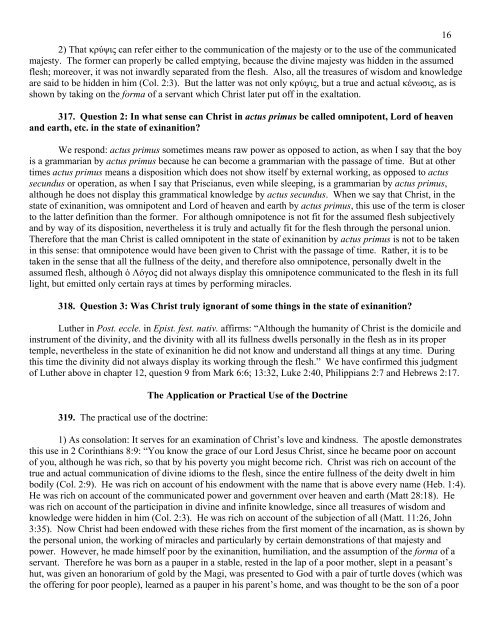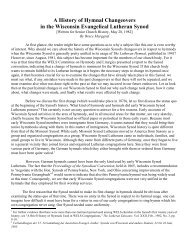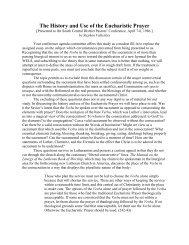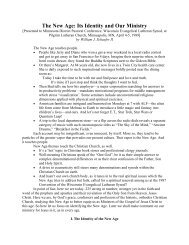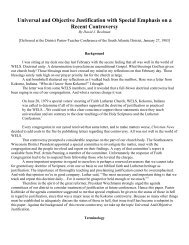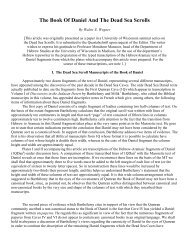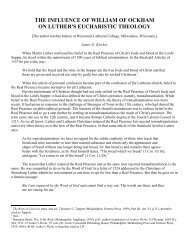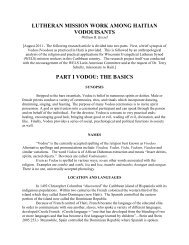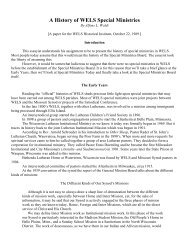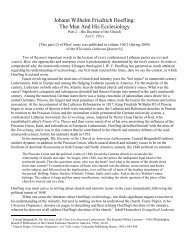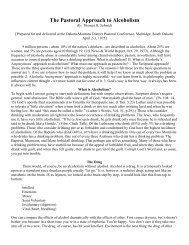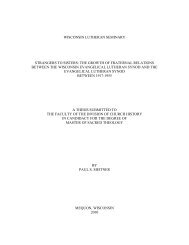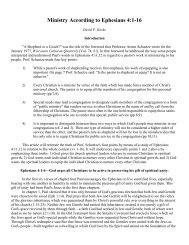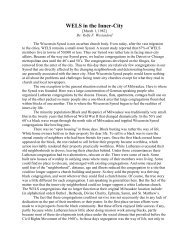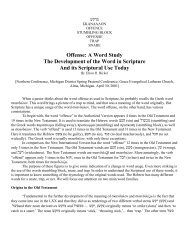Loci Theologici Loci Theologici
Loci Theologici Loci Theologici
Loci Theologici Loci Theologici
You also want an ePaper? Increase the reach of your titles
YUMPU automatically turns print PDFs into web optimized ePapers that Google loves.
16<br />
2) That κρύψις can refer either to the communication of the majesty or to the use of the communicated<br />
majesty. The former can properly be called emptying, because the divine majesty was hidden in the assumed<br />
flesh; moreover, it was not inwardly separated from the flesh. Also, all the treasures of wisdom and knowledge<br />
are said to be hidden in him (Col. 2:3). But the latter was not only κρύψις, but a true and actual κένωσις, as is<br />
shown by taking on the forma of a servant which Christ later put off in the exaltation.<br />
317. Question 2: In what sense can Christ in actus primus be called omnipotent, Lord of heaven<br />
and earth, etc. in the state of exinanition?<br />
We respond: actus primus sometimes means raw power as opposed to action, as when I say that the boy<br />
is a grammarian by actus primus because he can become a grammarian with the passage of time. But at other<br />
times actus primus means a disposition which does not show itself by external working, as opposed to actus<br />
secundus or operation, as when I say that Priscianus, even while sleeping, is a grammarian by actus primus,<br />
although he does not display this grammatical knowledge by actus secundus. When we say that Christ, in the<br />
state of exinanition, was omnipotent and Lord of heaven and earth by actus primus, this use of the term is closer<br />
to the latter definition than the former. For although omnipotence is not fit for the assumed flesh subjectively<br />
and by way of its disposition, nevertheless it is truly and actually fit for the flesh through the personal union.<br />
Therefore that the man Christ is called omnipotent in the state of exinanition by actus primus is not to be taken<br />
in this sense: that omnipotence would have been given to Christ with the passage of time. Rather, it is to be<br />
taken in the sense that all the fullness of the deity, and therefore also omnipotence, personally dwelt in the<br />
assumed flesh, although ὁ Λόγος did not always display this omnipotence communicated to the flesh in its full<br />
light, but emitted only certain rays at times by performing miracles.<br />
318. Question 3: Was Christ truly ignorant of some things in the state of exinanition?<br />
Luther in Post. eccle. in Epist. fest. nativ. affirms: “Although the humanity of Christ is the domicile and<br />
instrument of the divinity, and the divinity with all its fullness dwells personally in the flesh as in its proper<br />
temple, nevertheless in the state of exinanition he did not know and understand all things at any time. During<br />
this time the divinity did not always display its working through the flesh.” We have confirmed this judgment<br />
of Luther above in chapter 12, question 9 from Mark 6:6; 13:32, Luke 2:40, Philippians 2:7 and Hebrews 2:17.<br />
319. The practical use of the doctrine:<br />
The Application or Practical Use of the Doctrine<br />
1) As consolation: It serves for an examination of Christ’s love and kindness. The apostle demonstrates<br />
this use in 2 Corinthians 8:9: “You know the grace of our Lord Jesus Christ, since he became poor on account<br />
of you, although he was rich, so that by his poverty you might become rich. Christ was rich on account of the<br />
true and actual communication of divine idioms to the flesh, since the entire fullness of the deity dwelt in him<br />
bodily (Col. 2:9). He was rich on account of his endowment with the name that is above every name (Heb. 1:4).<br />
He was rich on account of the communicated power and government over heaven and earth (Matt 28:18). He<br />
was rich on account of the participation in divine and infinite knowledge, since all treasures of wisdom and<br />
knowledge were hidden in him (Col. 2:3). He was rich on account of the subjection of all (Matt. 11:26, John<br />
3:35). Now Christ had been endowed with these riches from the first moment of the incarnation, as is shown by<br />
the personal union, the working of miracles and particularly by certain demonstrations of that majesty and<br />
power. However, he made himself poor by the exinanition, humiliation, and the assumption of the forma of a<br />
servant. Therefore he was born as a pauper in a stable, rested in the lap of a poor mother, slept in a peasant’s<br />
hut, was given an honorarium of gold by the Magi, was presented to God with a pair of turtle doves (which was<br />
the offering for poor people), learned as a pauper in his parent’s home, and was thought to be the son of a poor


